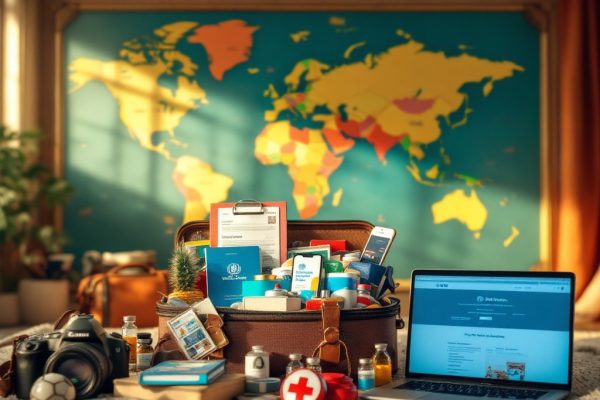International Flights – What Vaccines May be Mandatory
Planning international travel? Safeguard your health and ensure smooth entry by understanding mandatory vaccination requirements. Some countries require proof of yellow fever vaccination, particularly those in Africa and South America, while others may mandate the COVID-19 vaccine. Before you go, consult a healthcare professional or travel clinic to determine necessary vaccinations based on your itinerary and health status, and secure the essential International Certificate of Vaccination or Prophylaxis (ICVP). Learn more about these crucial travel preparations to enjoy a healthy and worry-free trip.
Important information

- Vaccination requirements vary by country and can change. Check your destination’s specific rules before traveling.
- Carry proof of vaccination, like the International Certificate of Vaccination or Prophylaxis (ICVP), or a digital equivalent where accepted.
- Consult a doctor or travel clinic for personalized advice. They can help determine needed vaccines based on your health and itinerary.
- Commonly required vaccines include yellow fever for certain parts of Africa and South America, and meningococcal vaccine for the “meningitis belt” in sub-Saharan Africa.
- Stay informed about recommended vaccines like Hepatitis A & B, typhoid, and rabies. Your individual needs may vary.
Understanding Mandatory Vaccines for International Flights
Traveling to a foreign country may expose you to diseases you’ve never encountered before, which is why some countries require proof of vaccination. To ensure smooth entry, adhere to these regulations. For example, proof of yellow fever vaccination is often mandatory for travelers going to or coming from affected regions. Some countries may also require the COVID-19 vaccine. While other vaccines, such as hepatitis A and B, typhoid, and MMR are generally recommended for travelers, they aren’t always compulsory. It’s crucial to verify the specific vaccination requirements of your destination, as these can change over time. Consulting a healthcare professional or a travel clinic will help determine the necessary vaccinations based on your itinerary and health status. Official health websites and travel medicine specialists can also offer further guidance.
Why Vaccines Are Important for International Travel
International travelers should ensure their routine vaccinations are up-to-date. This is crucial not only for personal protection against disease, but also to safeguard the health of those at your destination. Some countries require proof of vaccination, so consulting your doctor before traveling is essential to ensure you fulfill all necessary requirements.
Common Vaccines Required for International Travel
Before embarking on your travels, prioritize your health by consulting your doctor about recommended vaccinations based on your destination and planned activities. Here’s a general overview of common travel vaccines:
Yellow Fever: often mandatory for travel to certain regions of Africa and South America.
Meningococcal Vaccine: crucial for travelers venturing to the “meningitis belt” in sub-Saharan Africa.
Hepatitis A and B: generally recommended for most travelers.
Typhoid and Cholera: advisable for destinations with potentially unsafe water and food.
Rabies: consider this vaccine if your itinerary includes outdoor adventures or close contact with animals in regions where rabies is present.
Yellow Fever Vaccine: Essential for Certain Destinations
Planning a trip to certain regions, particularly in Africa or South America? A yellow fever vaccination is crucial due to the disease’s prevalence. This protects you and helps prevent global spread. When traveling to, or even transiting through, a high-risk area, be ready to present your International Certificate of Vaccination or Prophylaxis (ICVP). For specific entry requirements, consult your destination’s health authority or embassy.
Meningococcal Vaccine: Critical for Travel to Specific Regions
Planning a trip to specific regions? Meningococcal vaccination is crucial, particularly if you are traveling to the meningitis belt in Africa or the Hajj pilgrimage in Saudi Arabia. These areas are known for meningococcal outbreaks. The vaccine protects against these bacteria, which can cause severe illnesses such as meningitis. Protect yourself: get vaccinated.
Hepatitis A and B Vaccines: Key for Safe Travel
Hepatitis A spreads through contaminated food and water, posing a serious health risk, especially for travelers to regions with poor sanitation. Vaccination is recommended to prevent infection. Hepatitis B is transmitted through blood and bodily fluids. The Hepatitis B vaccine is crucial for individuals potentially exposed, such as healthcare workers, and is also advisable for those traveling to high-risk areas. Consulting a doctor before traveling is always recommended.
Hepatitis A
spreads through contaminated food and water, posing a serious health risk, especially for travelers to regions with poor sanitation. Vaccination is recommended to prevent infection.
Hepatitis B
is transmitted through blood and bodily fluids. The Hepatitis B vaccine is crucial for individuals potentially exposed, such as healthcare workers, and is also advisable for those traveling to high-risk areas.
Consulting a doctor before traveling is always recommended.
Typhoid and Cholera Vaccines: Recommended for Areas with Sanitation Issues
Typhoid and cholera are preventable diseases, and vaccines offer crucial protection against them. Travelers to regions with potential food and water contamination, particularly those with poor sanitation, should consider the typhoid vaccine. The cholera vaccine, however, is generally recommended for areas experiencing outbreaks. Both vaccines provide vital safeguards and peace of mind when sanitation may be compromised.
Rabies Vaccine: Important for High-Risk Travelers
Planning a trip to a remote area with limited medical care? Enjoy outdoor adventures like caving and camping? Work with animals? If so, the rabies vaccine is a crucial safeguard. Research shows pre-exposure vaccination offers significant protection, greatly reducing your risk of contracting this dangerous disease. Protect yourself and get vaccinated.
Mandatory Vaccination Requirements for International Travelers
International travel often involves vaccination requirements to prevent the spread of disease. Travelers should carry proof of these vaccinations. Specific requirements vary depending on the destination and can change based on current health risks. For the most accurate information, consult official health websites and travel advisories. Speaking with a doctor or travel medicine specialist is also recommended. They can create a personalized vaccination plan that addresses your individual health needs and ensures your vaccinations are current.
Countries with Stricter Vaccination Policies
Some countries have stricter vaccination requirements. These include Australia, some South Pacific Island nations, and a few in Africa. Travelers may need to show proof of vaccinations beyond routine ones, such as yellow fever, especially if visiting at-risk areas. Proof of polio vaccination might be required for travelers coming from or transiting through regions where polio is present.
Proof of Vaccination: What You Need to Know
For international travel, you will need proof of vaccination. The “yellow card,” officially known as the International Certificate of Vaccination or Prophylaxis (ICVP), is widely accepted and details your vaccine history. Some countries accept digital records, while others have unique requirements. To avoid complications, consult the destination’s embassy or consulate for specific vaccination requirements. Airlines may also request proof of vaccination before boarding. Ensure you have the necessary documentation to prevent travel disruptions.
International Certificate of Vaccination or Prophylaxis (ICVP)
Your International Certificate of Vaccination or Prophylaxis (ICVP) is official proof of your vaccinations, ensuring safe travels. This document is recognized globally.
Vaccination Recommendations for Specific Traveler Groups
Before traveling, immunocompromised individuals and pregnant women should consult their doctors. They should discuss necessary precautions and any additional vaccinations they might require, depending on their health status and destination. Healthcare providers can offer personalized guidance tailored to their specific needs.
Considerations for Immunocompromised Travelers
Before any international trip, individuals with weakened immune systems should consult a doctor or travel clinic. These specialists can offer advice on safe vaccinations and suggest ways to minimize health risks abroad. This personalized guidance is key for safer travels.
Precautions for Pregnant Travelers
Consult your physician before your trip. They can provide personalized advice on necessary vaccinations and health precautions based on your health and destination.
Discuss vaccinations with your doctor. Some vaccines, like MMR, are not safe during pregnancy, while others, like the flu shot, are generally recommended.
Understand potential health risks at your destination, such as Zika virus or malaria, and learn how to minimize them.
Obtain travel insurance that covers pregnancy-related complications.
Pack essential medications, including prenatal vitamins.
Stay hydrated and eat nutritious foods during your travels.
Avoid strenuous activities, listen to your body, and seek medical care if necessary.
How to Obtain Necessary Vaccines for International Travel
Consult your doctor or a travel clinic about necessary vaccinations and ensure your immunizations are current. Government health websites, such as the CDC, provide up-to-date information on required and recommended vaccines. Travel advisories from organizations like the World Health Organization also offer valuable guidance. For personalized recommendations based on your health history and itinerary, consult your doctor.
Consulting with Health Practitioners and Travel Clinics
Travel clinics and healthcare providers offer personalized consultations to assess your health risks and recommend appropriate vaccines for your trip. They provide destination-specific advice, including information on disease outbreaks and necessary vaccinations. These clinics also offer guidance on preventing other health risks, helping you stay safe and healthy while traveling abroad.
Ensuring Your Immunization Records are Up-to-Date
Maintain accurate immunization records for seamless international travel. Many countries demand proof of vaccination to meet their health standards. These records facilitate smoother border crossings and may even prevent quarantine. They also document your immunity to preventable diseases while abroad. Before traveling, consult a healthcare provider or travel clinic to ensure your records are complete and current for a healthy and enjoyable trip.
Utilizing Technology for Travel Health Verification
Technology is revolutionizing travel health verification. Digital tools, such as vaccine passports and health passes, are essential for streamlining health checks at borders and throughout your journey. For information on required vaccinations, consult the following resources:
- Official government health websites,
- Travel advisories,
- Your local health department,
- Websites of embassies and consulates.
These resources can provide details on entry requirements, including vaccination mandates. For personalized advice, consult a travel medicine specialist or visit a travel clinic for tailored recommendations.
Understanding Vaccine Passports and Digital Health Passes
Vaccine passports and digital health passes provide official vaccination proof, streamlining international travel. These digital documents expedite border crossings and security checks, encompassing COVID-19 records, other immunizations, and test results. Utilized by various apps and platforms, these passes contribute to safer, more efficient global travel. For example, some airlines require them for boarding. However, data privacy and security discussions continue, and global interoperability remains a challenge. These digital tools are transforming travel, aiming to enhance post-pandemic safety.
















